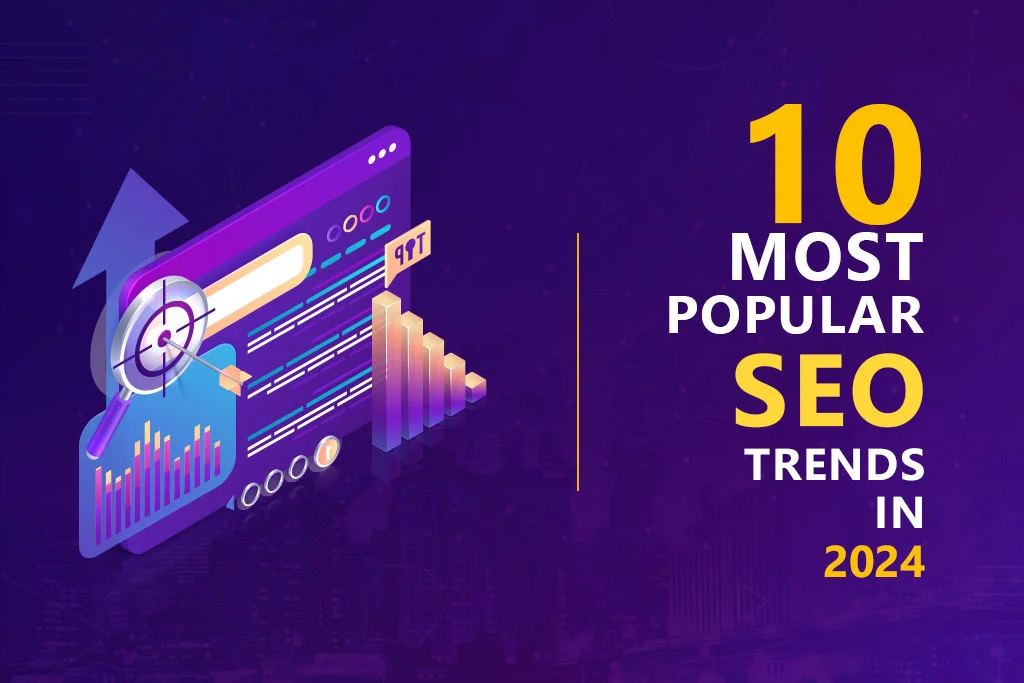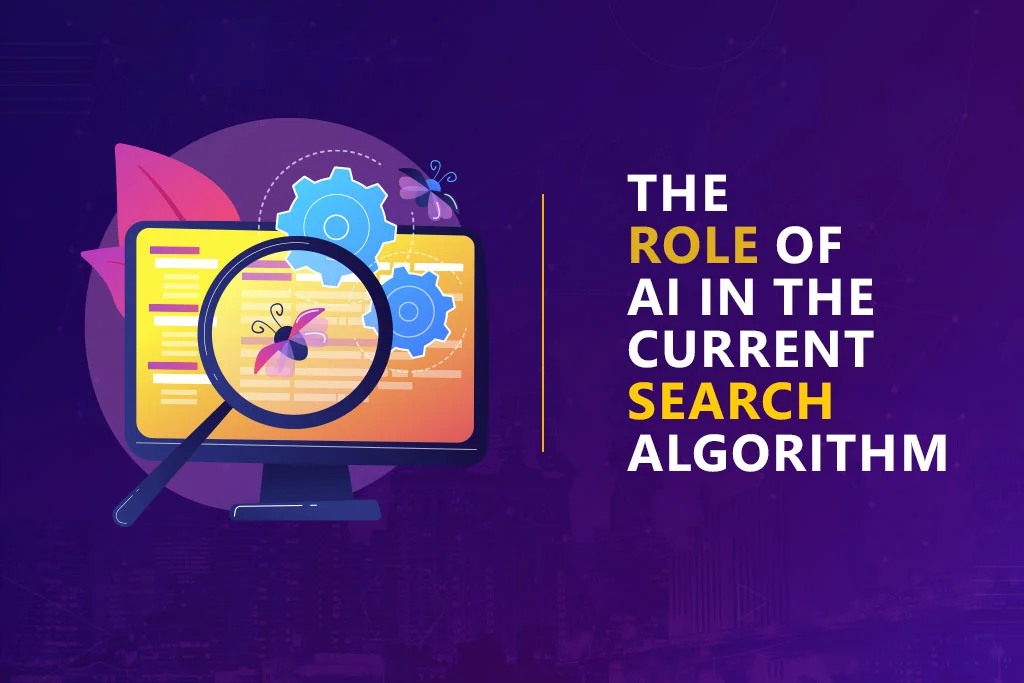Latest SEO Trends You Need to Know in 2024

Do you want to know about the latest SEO trends in 2024? We have got you covered. The SEO landscape is set to change greatly by 2024. Now, staying up-to-date on the latest developments is vital for businesses. They are trying to preserve their online presence. With fresh algorithm updates, advances in AI technology, and changing consumer preferences. SEO specialists have to change their techniques to stay ahead of the competition. In this blog, we’ll look at the latest SEO trends for 2024, which are expected to affect digital marketing. Voice search optimization and highlighted snippets are becoming increasingly important, as well as user experience and technical SEO. These changes are likely to have a significant impact on search rankings and internet visibility. By enhancing and combining these trends into their plans, organizations may position themselves for success in the ever-changing SEO field.
10 Most Popular SEO Trends in 2024:

1. Google Search Generative Experience:
One of the important latest SEO trends for 2024 is the introduction of Google’s Search Generative Experience. This refers to Google’s growing usage of AI and machine learning algorithms to produce customized search results. To optimize for SGE, focus on providing high-quality, user-focused content that is suitable for the searcher’s aim. Understand the context of the search terms and deliver complete, relevant information.
2. Exploring Voice And Mobile Search:
Remember when searching required typing? Now you can simply talk to your phone to find things. No more mistakes or autocorrect issues. Let’s discuss voice and mobile searches. They have modified Search Engine Optimization. Businesses should make their websites easier to find via voice search. Many people use phones, so make sure your material appears great on them. Voice and mobile search can help you reach more individuals and spark their curiosity.
3. Mobile-First Indexing:
Mobile-first indexing is Google’s method of indexing and ranking a website’s content based on its mobile version rather than its desktop version. Google used to examine both the desktop and mobile versions of pages. They primarily used the desktop version for search results. However, with the transition to mobile-first indexing, Google’s indexing algorithm now focuses on the mobile page for content accuracy. This change has a big impact on SEO since it affects the way Google scans, indexes, and ranks websites. If your website is not mobile-friendly, it may not appear in search results or will rank lower.
4. User Experience:
Google wants to improve the user experience on websites. It affects Search Engine Optimization rankings. They track user interaction to determine how visitors interact with your website. The goal of user experience is to make websites more usable and efficient. Because UX affects Search Engine Optimization. It’s critical to evaluate and improve your website’s usability. Your content should be valuable, relevant, and easily accessible. Your website should load quickly, be easy to navigate, and use clear fonts and graphics. It should also be secure and open to all. Prioritizing User Experience enhancements can boost your SEO strategy and help your site rank higher on Google.
5. The Role Of AI In The Current Search Algorithm:

The growing usage of AI, particularly through tools like ChatGPT, Bing AI, and Google Bard, has altered content consumption. It also greatly impacts search engines and Search Engine Optimization methods. There are four main ways how AI has impacted Google’s search algorithm:
Google’s Adoption Of AI In Its Search Algorithm:
Google has embraced AI, most notably with Google Bard, which improves its search algorithm. This AI integration enables Google to better learn user goals and context. It results in more personalized and relevant search results. Google’s increased natural language processing produces higher-quality search results, which improves the entire user experience.
Google’s Views On AI-Generated Content:
LMs such as ChatGPT and Google Bard can produce content faster than humans. It prompts problems about how search engines perceive AI-generated content. However, Google prioritizes quality and significance regardless of whether the material is generated by AI or written by humans. It shows that AI-generated content can rank high if it is valuable to readers. AI alone won’t be enough in the absence of significant content creation.
Improved Identification Of Low-Quality Links And Spam:
In 2018, Google launched SpamBrain, an AI-powered spam detection system. It detects and punishes spammy content, such as keyword stuffing and link schemes. It improves search quality. Google also utilizes artificial intelligence to evaluate link quality. It promotes high-quality material and improves user happiness in search results.
AI’s Role In SEO And Content Marketing:
AI is changing SEO and content marketing through predictive analysis, tailored content, and automated content generation. It also improves keyword research, user experience, and optimization for voice and visual searches. Using AI can result in more effective strategies and higher search ranks.
6. Importance Of Content Quality And E-E-A-T:
Improving your content with E-E-A-T (Experience, Expertise, Authority, and Trustworthiness) is critical to success. Did you know that 57% of marketers now prioritize high-quality content? Let’s look at why understanding E-A-T is so important for your content’s success.
Experience And Expertise:
Your content reflects your knowledge and unique insights. It increases trust and value for your audience.
Authoritativeness:
Your goal is to become the most respected expert in your niche. This requires you to offer informative, acceptable, and trusted information in your field.
Trustworthiness:
Building trust is vital. Establish transparency, cite credible sources, and actively communicate with your audience. This builds a loyal reading base and increases the credibility of your content.
Regular Updates:
Keeping content fresh is important. It shows your familiarity with current trends and commitment to giving timely, relevant information. Prioritize quality over quantity.
Quality Over Quantity:
Quality always beats quantity. High-quality content is more shareable and link-worthy, which helps your SEO efforts.
7. Create Video Content:
In today’s digital environment, video content is essential. It captures far more viewers’ attention than written text or photos. Improve your SEO with these tips:
- 1. Use strategic keywords to guide search engines.
- 2. To retain viewers, ensure that your films are clear and professional.
- 3. Optimize for mobile viewing to reach a larger audience.
- 4. Increase access and keyword detection.
- 5. Capture your audience’s attention with visually appealing content.
- 6. Short, powerful videos work best.
- 7. Increase visibility by posting across several networks.
- 8. Interact with viewers to increase Search Engine Optimization impact.
8. Featured Snippets:
Featured snippets are short text takes that appear at the top of search results. They respond quickly to users’ search queries. These snippets might be arranged in numbered lists, bullet points, or single paragraphs. Compared to traditional search results, they show before the link to a webpage. Featured snippets help your content stand out in search results and can increase visibility. They also capture visitors from competitors on the first page of search results. In the end, highlighted snippets are a quick way to rank on Google’s first page, and they are becoming increasingly significant.
9. Zero-Click Results:
Zero-click searches are becoming more popular, as many users do not click on search results. This occurs for a variety of reasons.
- For local companies or services, Google often shows information in the local pack or map pack.
- Quick conversions or calculations, such as currency or unit conversions, appear straight in the SERPs.
- Public users or celebrities produce knowledge sheets with basic information such as age and occupation.
- These searches usually terminate without a click since Google’s SERP features, such as knowledge panels and local packs. It delivers quick and concise responses. Users can acquire the information they need without clicking on a link.
10. Reverse Outreach:

Reverse outreach in content marketing changes the landscape. Rather than reaching out to others, you attract them to yourself. It is about making your material so appealing that people seek it out. It’s like being the most popular child at the party, everyone wants to talk to you. This strategy encourages connections while increasing the influence of your content.
Create Share-Worthy Content:
Focus on creating high-quality, engaging material. Consider themes that will connect with your target audience, address a problem, or provide new insights. The more important your content, the more likely others will contact you for collaborations or shares.
Leverage Social Media:
Use social media for advertising your work. Regular articles, compelling infographics, and interactive surveys can capture the attention of influencers and industry leaders. Make your material easier to find and share.
Participate In Online Communities:
Participate actively in online discussions and networks related to your field. By providing useful insights, you can draw attention to your expertise and material.
Optimize For SEO:
To improve SEO rankings, make sure your material has been optimized for search engines. When your content ranks at the top of search engines, it organically attracts backlinks and outreach opportunities.
Monitor Your Brand:
Use tools to monitor brand mentions. When someone mentions your brand, contact them. This can lead to successful collaborations and more content sharing.
Conclusion:
In today’s digital environment, being current on SEO developments is critical for organizations to succeed online. Just like riding a bicycle on a busy highway won’t get you very far. If you ignore SEO in the fast-paced world of digital marketing, it might leave you behind. With 68% of online visits beginning with a search engine, adjusting to SEO changes is critical. Voice searches, mobile-friendly websites, and AI-driven optimization are all emerging trends that offer considerable opportunities for organizations. By adopting these trends, businesses can improve their visibility and relevance in search results. It draws more organic traffic without relying entirely on paid advertisements. In simple terms, simply being online isn’t enough. For Search Engine Optimization services, you can easily rely on MediaEclips which is the best Plano SEO agency. Make a consultation call whenever you want to clear your doubts and services.
FAQs:
AI will not destroy SEO, it will change it, as shown with AEO. GPT-4 and other technologies improve SEO by providing deeper insights and automation. It allows for more tailored user experiences. SEO professionals must adapt by using AI to optimize content and methods for search engine algorithms and user intent.
SEO is essential for digital marketing. It increases visibility and organic traffic. While approaches change, optimizing for search engines remains important. With ever-changing algorithms and user habits, an organized approach is essential for online success.
Checking every few weeks or months should be enough. On-page difficulties are more common on complicated websites.

